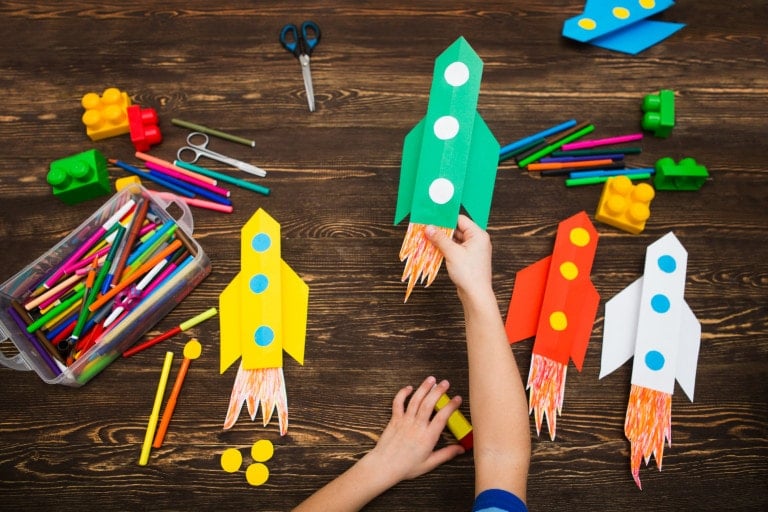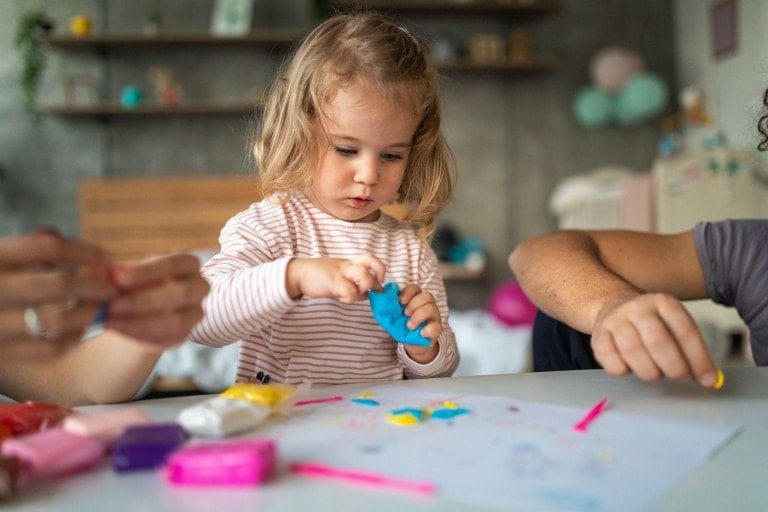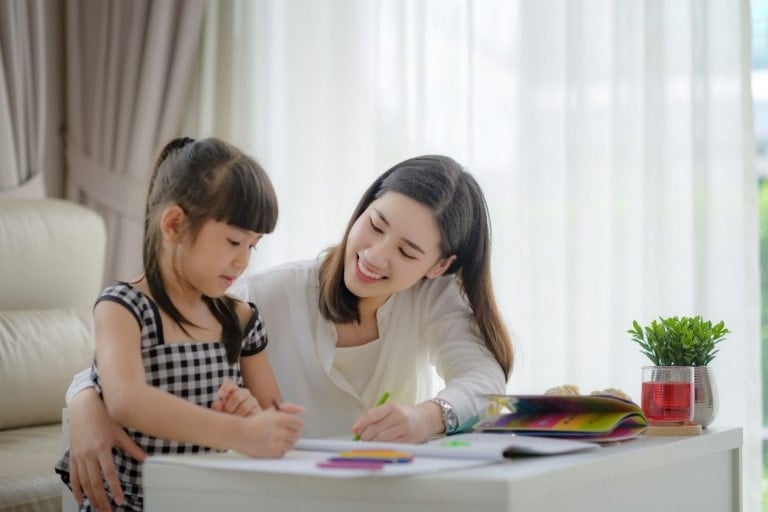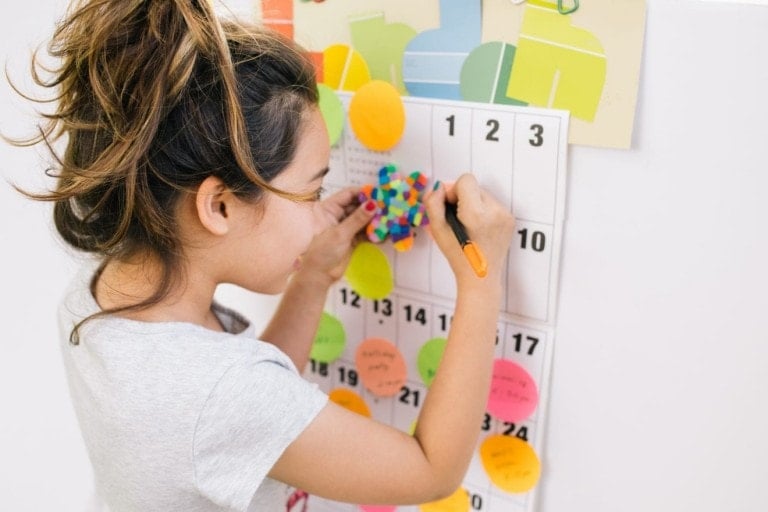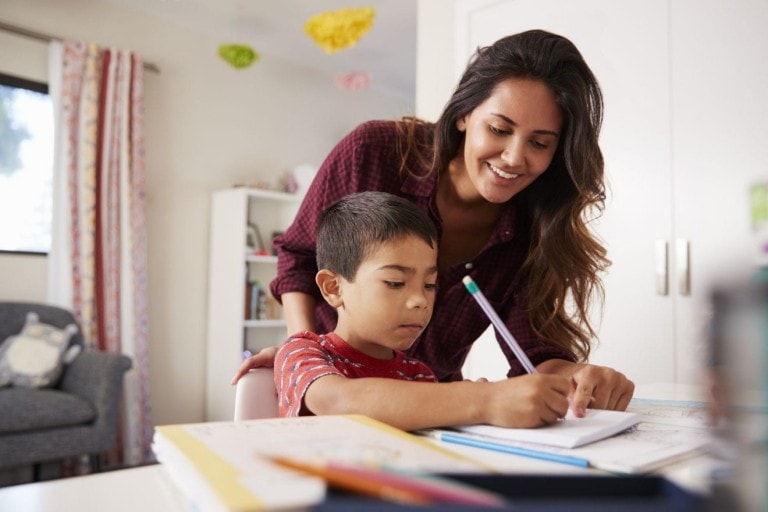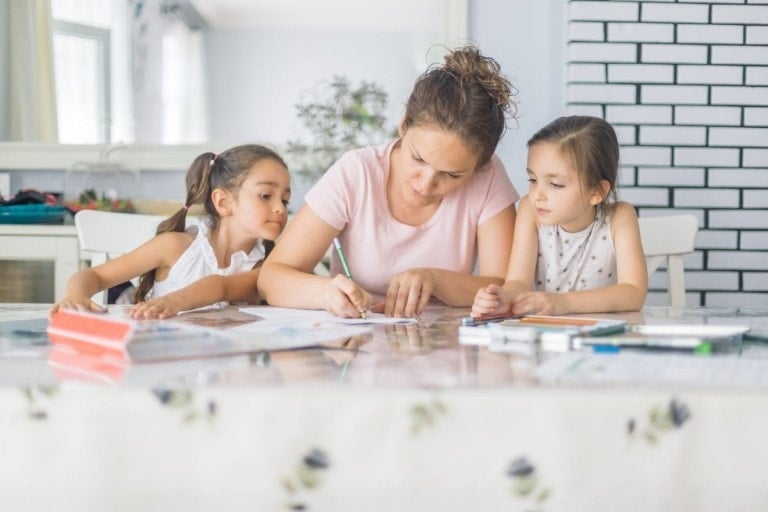Homeschooling while working from home is a challenge many parents never wanted. Yet, here we are, quarantined with our kids and doing our best to get things done. Whether you love it or hate it, when all of this is said and done, we will all have a new appreciation for our school teachers!
Keep in mind that what we are doing right now is not really homeschooling. This is isolation schooling, and it’s not fun for anyone. Normal homeschooling involves co-ops, field trips, and social gatherings with friends. But normal homeschooling also does not mean rigorous schedules and hours of learning. Nor should it now! Kids can learn in many different ways, and it’s not always about school subjects like math, reading, and science. Most kids learn best through play. Whether it’s free play or structured play is up to you!
Meanwhile, you still have to get work done. It can seem like an impossible task at times. Believe it or not, some parents homeschool and work from home even when there’s no pandemic! These rockstar parents know how to get it all done. Here are 10 tips for homeschooling your kids while working at home without stress and creating a happier and healthier family.
10 Tips for Homeschooling While Working From Home
1. Let Kids Wake Up on Their Own
My dear friend, Karen Barski, shared some tips with me on how she homeschools her three kids, ages 11 (twins) and 13. Karen is a mom of five, including twins, RN, Reiki Master IIII, a business coach, and inventor of a baby swaddle called the Woombie.
One key tip was that her kids are in bed sleeping by 10 PM, and she allows them to wake up on their own when their bodies are ready – usually around 9 AM. This gives her a few hours to work while the house is quiet.
I’ve tried this for the last couple of days with my four-year-old preschooler staying home from school, and it’s great! He also sometimes wakes up at 9 AM on his own and then at 8:30 AM on other days. I can meditate and work for a good couple of hours first thing in the morning without interruptions.
2. Set a Flexible Schedule
Making a homeschooling schedule is important, but keep in mind that it may not go exactly as planned, and this is okay. Some things may move around, and some things may not happen. Just know you are doing your best and approach each day with an open mind – it could be a calm and productive day or a day of chaos, but however it goes, make adjustments, so everyone stays happy and healthy.
Creating a schedule together is a great way to get your kids excited about school at home. You can make it on a big poster board as an art activity. I created our schedule on printable sheets so we can fill in the specific activities the day before.
3. Set a Positive Tone For the Day
I never look at my phone, emails, calendar, news, or social media when I wake up. DON’T DO IT! My life completely changed when I stopped reaching for my phone first thing when the day starts. Whatever we see or read, we associate emotions with it, and these emotions set the tone for our entire day. This is especially more important than ever due to the current crisis we are navigating.
So instead, here’s what I do. I first get my mindset right for the day. We all want to have a great day and accomplish great things, so these easy actions allow you to choose the tone for your day instead of letting your subconscious emotions and thoughts decide for you.
4. Practice Discovery Education
When we think of school, we think of the traditional school with periods of subjects – reading, math, science, social studies, gym, art, etc. Homeschooling is very different. My friend Karen gave me some excellent advice:
“We are not teachers by trade, but as parents, we are definitely teachers! Now is a great time to teach your kids life lessons, such as cooking, balancing checkbooks and budgeting, preparing for unlikely events such as pandemics, building a sustainable environment, gardening, baking bread, or even teaching them how to start their own business.
“Regarding the curriculum, I have tried many, and I like Discovery Education for short-term needs as it is very visual and easy. They offer free options, which is ideal for the temporary situation we are in.” Karen is a homeschooling mom of five (!!!), so she would know!
5. Make it Fun
We love finding things to smile and laugh about, even in the little things, especially since we are isolated at home. Sometimes my son and I just look out the window to see what birds we can spot, or we dress up and be silly, play hide and seek blindfolded (mama and papa wear the blindfold – not our son just yet), make up games and stories, bake, and more.
Think outside the box and add some pizazz to your homeschooling. Of course, there are a ton of great learning apps, but shoot for hands-on, interactive fun without technology too:
- Teach math and counting using puffs or pretzels
- For learning colors, say a color out loud, and everyone must run to the toy box, pick a toy of that color, and come back to the starting spot.
- For reading, use letter magnets on the fridge.
- Teach writing by tracing the letters of your name
- Teach science by doing a cool experiment (here are 20 science experiments toddlers can do at home – these would even work for elementary school kids)
- Create a scavenger hunt to practice critical thinking
Just remember each day doesn’t have to be perfect. Just keep smiling, having fun, and making healthy choices for you and your kids.
6. Set Free Periods Often
Free play and free time are important so kids feel like they get a break and choose what to do. This allows kids to explore and grow independently and not always be in a structured environment. I schedule free play blocks of 30 minutes to one hour, but there are other opportunities for some free time throughout the day:
- while I prepare lunch
- quiet time during nap time for older kids
- while dinner is being prepared
- while I am finishing up some work during scheduled block transitions
- after your kid is in bed at night
Free time in our house is truly a free choice – that’s what free means, right?! So however your kid wants to spend his little window of free time (within reason), allow it! Other parts of the day are balanced with hands-on play, activities, exercise, and other fun.
7. Integrate a Balanced Technology Approach
Homeschooling while working from home will inevitably involve technology. Whether it’s a learning app or just a movie to give you time to yourself, screen time will be a huge factor. Technology is a big part of life and will only get more advanced. Like anything in excess, technology can be abused and thus resulting in negative effects. But these can be avoided by being preventative and balancing technology with other activities such as hands-on fun, make-believe play, reading books, running and playing outside, exploring nature, and more.
In our family, we believe the positive benefits of technology (aka “screen time“) outweigh the potential negative effects, and we can actually negate negative effects pretty well as parents. If our child does more hands-on than the time spent on the iPad, it’s a win in our book. I would say it’s about a 20% to 80% ratio (technology to non-technology activities), but this changes – rainy days could be more and nice summer days, we might barely use the iPad because we are playing so much outside,
8. Be Patient and Give Praise and Appreciation
Homeschooling while working from home is a big adjustment for you and the kids, so be patient. If things don’t go perfectly, that’s okay. You are doing a great job, and so are your kiddos!
Don’t forget to praise your kids for doing a fab job learning at home and adjusting to the new schedule. Let them know you appreciate their effort and cooperation. I get right down at eye level with my 4-year-old and look him in the eyes with a big smile and tell him how well he’s doing and that I appreciate his good listening. I end it with a big hug. When we do this, our kid behaves better.
9. Start a Gratitude Journal
It’s even more important to have gratitude for what you do have during times of hardship and stress. Instead of focusing on what kids (and parents!) cannot do right now with social distancing, have gratitude for what we do have. You can list things such as your health, home, family, the food we eat, clean water, technology to stay connected virtually, nature to explore, and so much more. You could even list homeschooling while working from home because it affords you more time with your quickly growing kids!
A great way to introduce gratitude to your kids is to encourage them to start a gratitude journal. At the end of the school day, have them jot down things they are grateful for. And for parents, right before you go to bed, write five things you are grateful for in your own journal. Gratitude helps keep us grounded and positive, which is especially needed during times of crisis.
10. Get Outside and Play
Don’t forget playtime outside. Vitamin D boosts the immune system. Plus, kids can burn energy and stay healthy since exercise also boosts the immune system. Take a break from work and get outside with the kids – we need vitamin D too. That 15-minute break outside and away from your desk will boost your productivity in the long run.
Be present with your kids. When you leave your desk, you leave your desk—no scrolling the phone or checking emails outside during playtime. Get your sneakers on and play. A great benefit is that your kids will be happy, and being out in nature will boost your happiness for 24 hours – I learned this from Diane Lang, a positive living therapist and author I follow.
Playtime can be inside, too, especially when the weather is not cooperating. Put away phones and turn off the TV. Get down on the floor, build Legos, and blocks, do an art activity, play make-believe, cuddle, and read a book. Even if it’s just five minutes, getting down on the floor with your kids gives them the attention they need, and something magical happens – they behave!
As we all rally together to get through COVID-19 as quickly as possible, remember to keep your children away from playdates and anyone in the neighborhood wanting to play. To stop transmission, we must take this seriously! Life will resume back to normal, so in the meantime, enjoy the extra time with family, and find the silver linings in everything. It’s okay if more of your days (or afternoons!) involve a glass of wine (for me, a 15-minute Epson Salt soak in the bath is just as relaxing!).
While suddenly homeschooling while working from home is not ideal, it will not be forever. Follow these tips to set yourself up for success and hang on for the ride! Just remember, we mothers are strong, and we’ve got this.




















